Orientation for Success: Reflective Learning in Higher Education
VerifiedAdded on 2023/06/12
|7
|2164
|292
Essay
AI Summary
This essay explores the concept and significance of reflective learning in enhancing professional expertise within higher education. It discusses the reflective approach to learning, highlighting the importance of self-evaluation, critical thinking, and problem-solving skills. The essay also examines reflective models like the Gibbs model, detailing its six stages from description to action plan, and its application in improving learning through feedbacks and feedforwards. Furthermore, it analyzes the role of feedforward and feedback in improving both formative and summative assessments, emphasizing the importance of understanding limitations and weaknesses to enhance learning and achieve developmental goals. The document is available on Desklib, a platform offering a wide range of study tools and solved assignments for students.
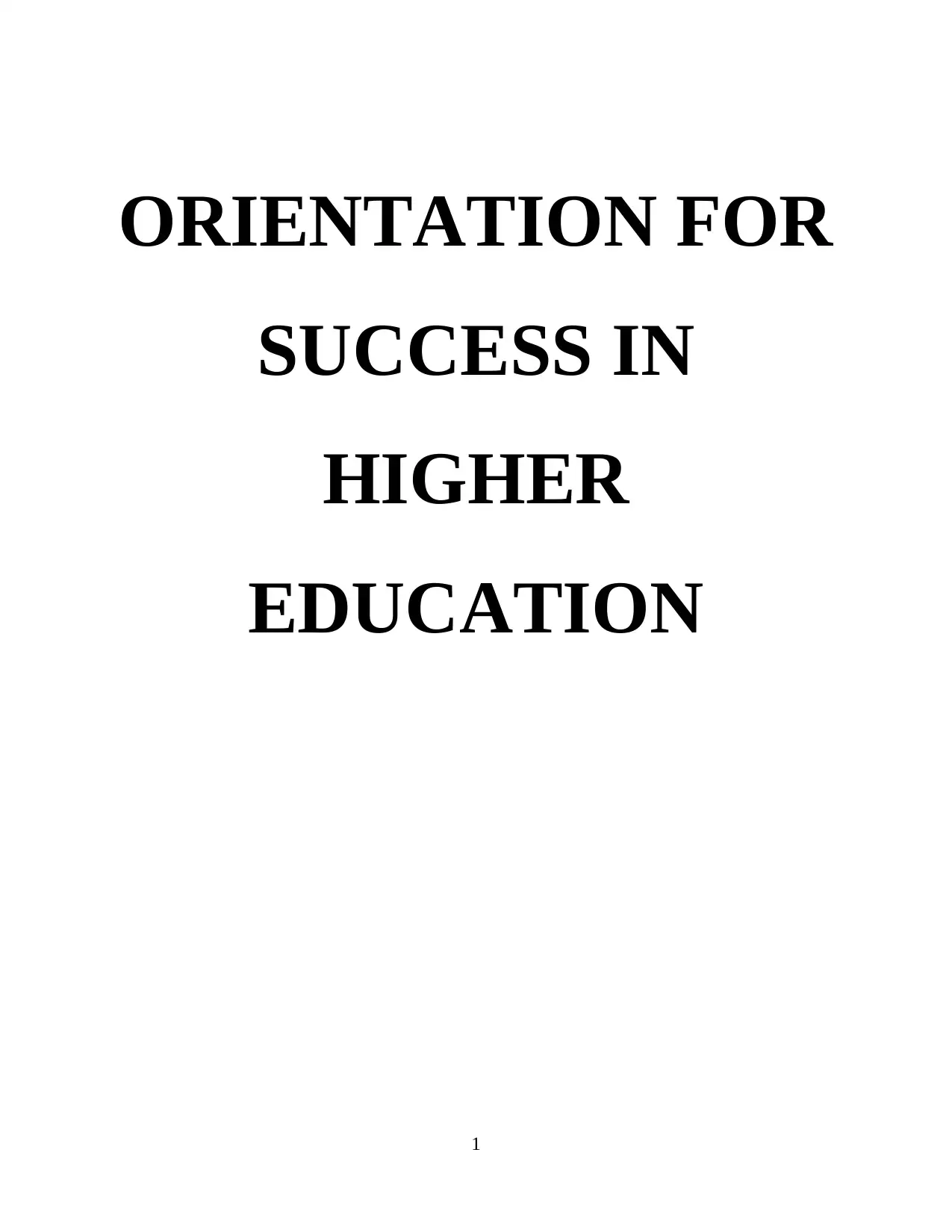
ORIENTATION FOR
SUCCESS IN
HIGHER
EDUCATION
1
SUCCESS IN
HIGHER
EDUCATION
1
Paraphrase This Document
Need a fresh take? Get an instant paraphrase of this document with our AI Paraphraser
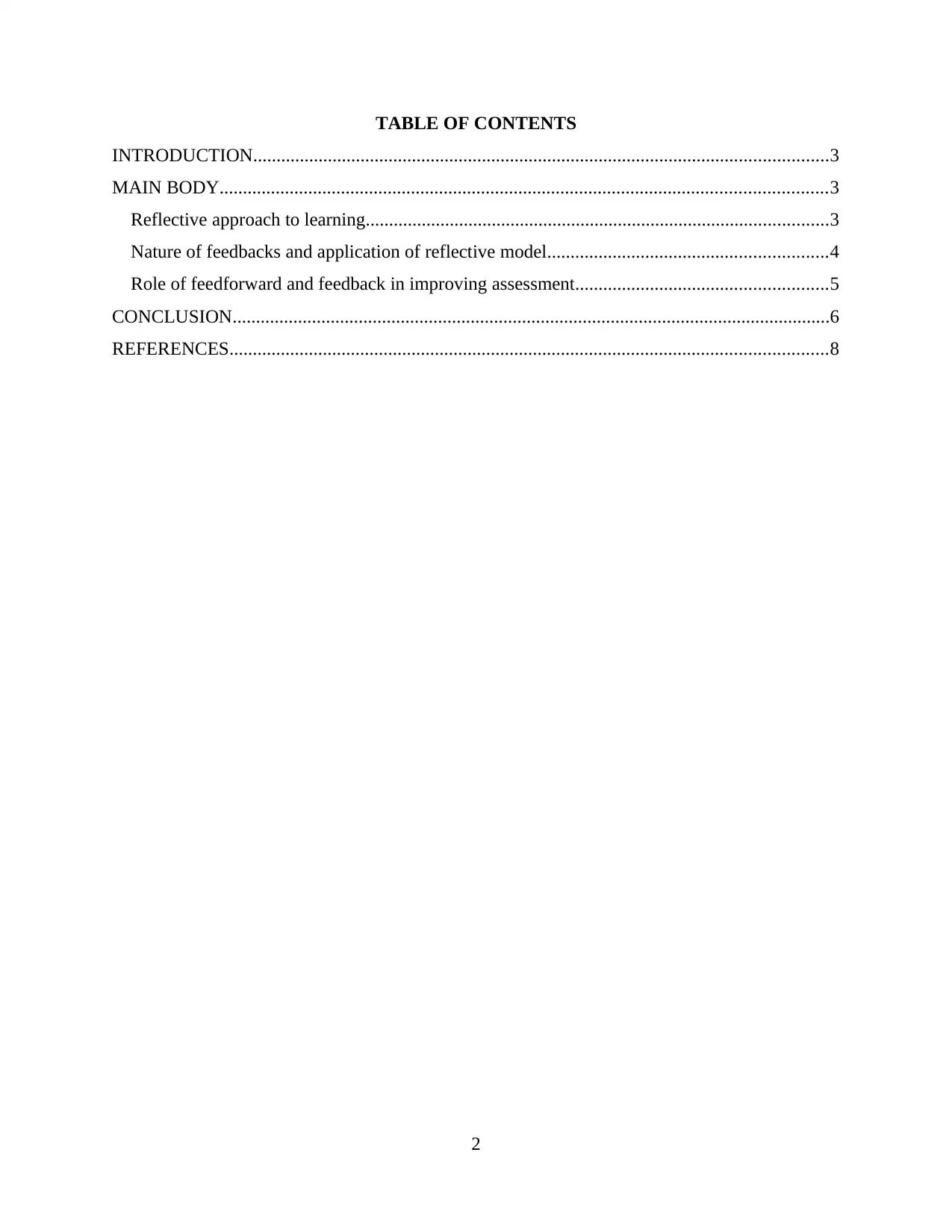
TABLE OF CONTENTS
INTRODUCTION...........................................................................................................................3
MAIN BODY..................................................................................................................................3
Reflective approach to learning...................................................................................................3
Nature of feedbacks and application of reflective model............................................................4
Role of feedforward and feedback in improving assessment......................................................5
CONCLUSION................................................................................................................................6
REFERENCES................................................................................................................................8
2
INTRODUCTION...........................................................................................................................3
MAIN BODY..................................................................................................................................3
Reflective approach to learning...................................................................................................3
Nature of feedbacks and application of reflective model............................................................4
Role of feedforward and feedback in improving assessment......................................................5
CONCLUSION................................................................................................................................6
REFERENCES................................................................................................................................8
2
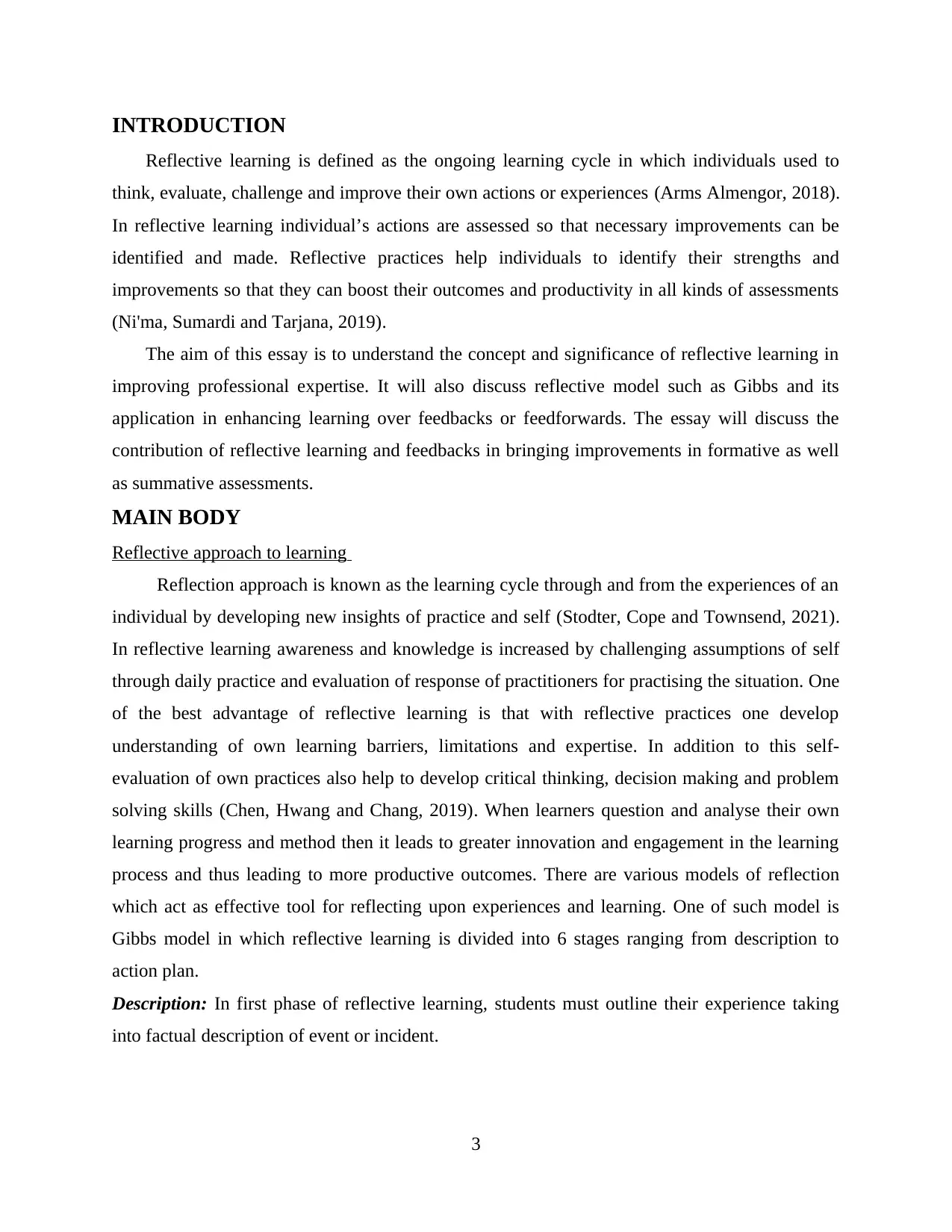
INTRODUCTION
Reflective learning is defined as the ongoing learning cycle in which individuals used to
think, evaluate, challenge and improve their own actions or experiences (Arms Almengor, 2018).
In reflective learning individual’s actions are assessed so that necessary improvements can be
identified and made. Reflective practices help individuals to identify their strengths and
improvements so that they can boost their outcomes and productivity in all kinds of assessments
(Ni'ma, Sumardi and Tarjana, 2019).
The aim of this essay is to understand the concept and significance of reflective learning in
improving professional expertise. It will also discuss reflective model such as Gibbs and its
application in enhancing learning over feedbacks or feedforwards. The essay will discuss the
contribution of reflective learning and feedbacks in bringing improvements in formative as well
as summative assessments.
MAIN BODY
Reflective approach to learning
Reflection approach is known as the learning cycle through and from the experiences of an
individual by developing new insights of practice and self (Stodter, Cope and Townsend, 2021).
In reflective learning awareness and knowledge is increased by challenging assumptions of self
through daily practice and evaluation of response of practitioners for practising the situation. One
of the best advantage of reflective learning is that with reflective practices one develop
understanding of own learning barriers, limitations and expertise. In addition to this self-
evaluation of own practices also help to develop critical thinking, decision making and problem
solving skills (Chen, Hwang and Chang, 2019). When learners question and analyse their own
learning progress and method then it leads to greater innovation and engagement in the learning
process and thus leading to more productive outcomes. There are various models of reflection
which act as effective tool for reflecting upon experiences and learning. One of such model is
Gibbs model in which reflective learning is divided into 6 stages ranging from description to
action plan.
Description: In first phase of reflective learning, students must outline their experience taking
into factual description of event or incident.
3
Reflective learning is defined as the ongoing learning cycle in which individuals used to
think, evaluate, challenge and improve their own actions or experiences (Arms Almengor, 2018).
In reflective learning individual’s actions are assessed so that necessary improvements can be
identified and made. Reflective practices help individuals to identify their strengths and
improvements so that they can boost their outcomes and productivity in all kinds of assessments
(Ni'ma, Sumardi and Tarjana, 2019).
The aim of this essay is to understand the concept and significance of reflective learning in
improving professional expertise. It will also discuss reflective model such as Gibbs and its
application in enhancing learning over feedbacks or feedforwards. The essay will discuss the
contribution of reflective learning and feedbacks in bringing improvements in formative as well
as summative assessments.
MAIN BODY
Reflective approach to learning
Reflection approach is known as the learning cycle through and from the experiences of an
individual by developing new insights of practice and self (Stodter, Cope and Townsend, 2021).
In reflective learning awareness and knowledge is increased by challenging assumptions of self
through daily practice and evaluation of response of practitioners for practising the situation. One
of the best advantage of reflective learning is that with reflective practices one develop
understanding of own learning barriers, limitations and expertise. In addition to this self-
evaluation of own practices also help to develop critical thinking, decision making and problem
solving skills (Chen, Hwang and Chang, 2019). When learners question and analyse their own
learning progress and method then it leads to greater innovation and engagement in the learning
process and thus leading to more productive outcomes. There are various models of reflection
which act as effective tool for reflecting upon experiences and learning. One of such model is
Gibbs model in which reflective learning is divided into 6 stages ranging from description to
action plan.
Description: In first phase of reflective learning, students must outline their experience taking
into factual description of event or incident.
3
⊘ This is a preview!⊘
Do you want full access?
Subscribe today to unlock all pages.

Trusted by 1+ million students worldwide
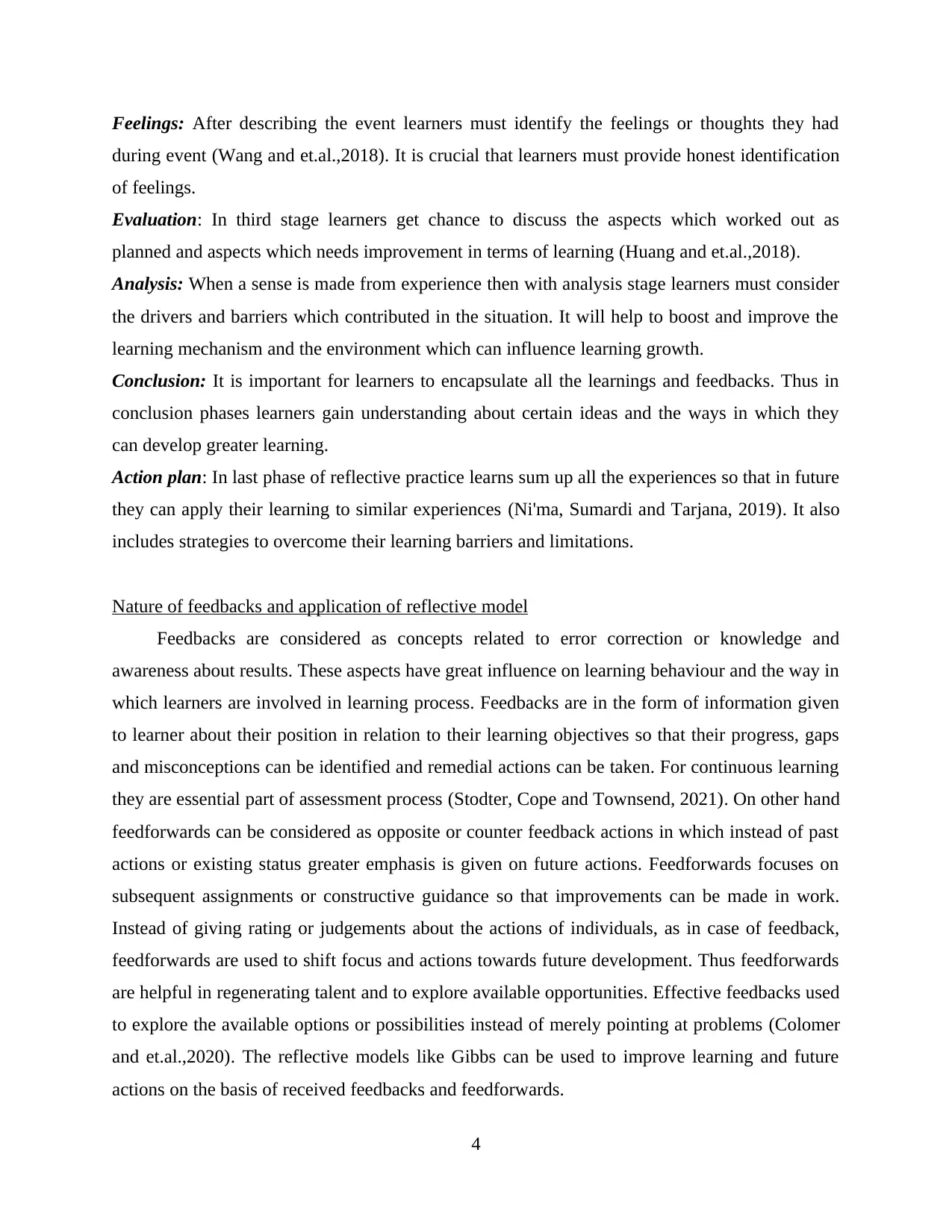
Feelings: After describing the event learners must identify the feelings or thoughts they had
during event (Wang and et.al.,2018). It is crucial that learners must provide honest identification
of feelings.
Evaluation: In third stage learners get chance to discuss the aspects which worked out as
planned and aspects which needs improvement in terms of learning (Huang and et.al.,2018).
Analysis: When a sense is made from experience then with analysis stage learners must consider
the drivers and barriers which contributed in the situation. It will help to boost and improve the
learning mechanism and the environment which can influence learning growth.
Conclusion: It is important for learners to encapsulate all the learnings and feedbacks. Thus in
conclusion phases learners gain understanding about certain ideas and the ways in which they
can develop greater learning.
Action plan: In last phase of reflective practice learns sum up all the experiences so that in future
they can apply their learning to similar experiences (Ni'ma, Sumardi and Tarjana, 2019). It also
includes strategies to overcome their learning barriers and limitations.
Nature of feedbacks and application of reflective model
Feedbacks are considered as concepts related to error correction or knowledge and
awareness about results. These aspects have great influence on learning behaviour and the way in
which learners are involved in learning process. Feedbacks are in the form of information given
to learner about their position in relation to their learning objectives so that their progress, gaps
and misconceptions can be identified and remedial actions can be taken. For continuous learning
they are essential part of assessment process (Stodter, Cope and Townsend, 2021). On other hand
feedforwards can be considered as opposite or counter feedback actions in which instead of past
actions or existing status greater emphasis is given on future actions. Feedforwards focuses on
subsequent assignments or constructive guidance so that improvements can be made in work.
Instead of giving rating or judgements about the actions of individuals, as in case of feedback,
feedforwards are used to shift focus and actions towards future development. Thus feedforwards
are helpful in regenerating talent and to explore available opportunities. Effective feedbacks used
to explore the available options or possibilities instead of merely pointing at problems (Colomer
and et.al.,2020). The reflective models like Gibbs can be used to improve learning and future
actions on the basis of received feedbacks and feedforwards.
4
during event (Wang and et.al.,2018). It is crucial that learners must provide honest identification
of feelings.
Evaluation: In third stage learners get chance to discuss the aspects which worked out as
planned and aspects which needs improvement in terms of learning (Huang and et.al.,2018).
Analysis: When a sense is made from experience then with analysis stage learners must consider
the drivers and barriers which contributed in the situation. It will help to boost and improve the
learning mechanism and the environment which can influence learning growth.
Conclusion: It is important for learners to encapsulate all the learnings and feedbacks. Thus in
conclusion phases learners gain understanding about certain ideas and the ways in which they
can develop greater learning.
Action plan: In last phase of reflective practice learns sum up all the experiences so that in future
they can apply their learning to similar experiences (Ni'ma, Sumardi and Tarjana, 2019). It also
includes strategies to overcome their learning barriers and limitations.
Nature of feedbacks and application of reflective model
Feedbacks are considered as concepts related to error correction or knowledge and
awareness about results. These aspects have great influence on learning behaviour and the way in
which learners are involved in learning process. Feedbacks are in the form of information given
to learner about their position in relation to their learning objectives so that their progress, gaps
and misconceptions can be identified and remedial actions can be taken. For continuous learning
they are essential part of assessment process (Stodter, Cope and Townsend, 2021). On other hand
feedforwards can be considered as opposite or counter feedback actions in which instead of past
actions or existing status greater emphasis is given on future actions. Feedforwards focuses on
subsequent assignments or constructive guidance so that improvements can be made in work.
Instead of giving rating or judgements about the actions of individuals, as in case of feedback,
feedforwards are used to shift focus and actions towards future development. Thus feedforwards
are helpful in regenerating talent and to explore available opportunities. Effective feedbacks used
to explore the available options or possibilities instead of merely pointing at problems (Colomer
and et.al.,2020). The reflective models like Gibbs can be used to improve learning and future
actions on the basis of received feedbacks and feedforwards.
4
Paraphrase This Document
Need a fresh take? Get an instant paraphrase of this document with our AI Paraphraser
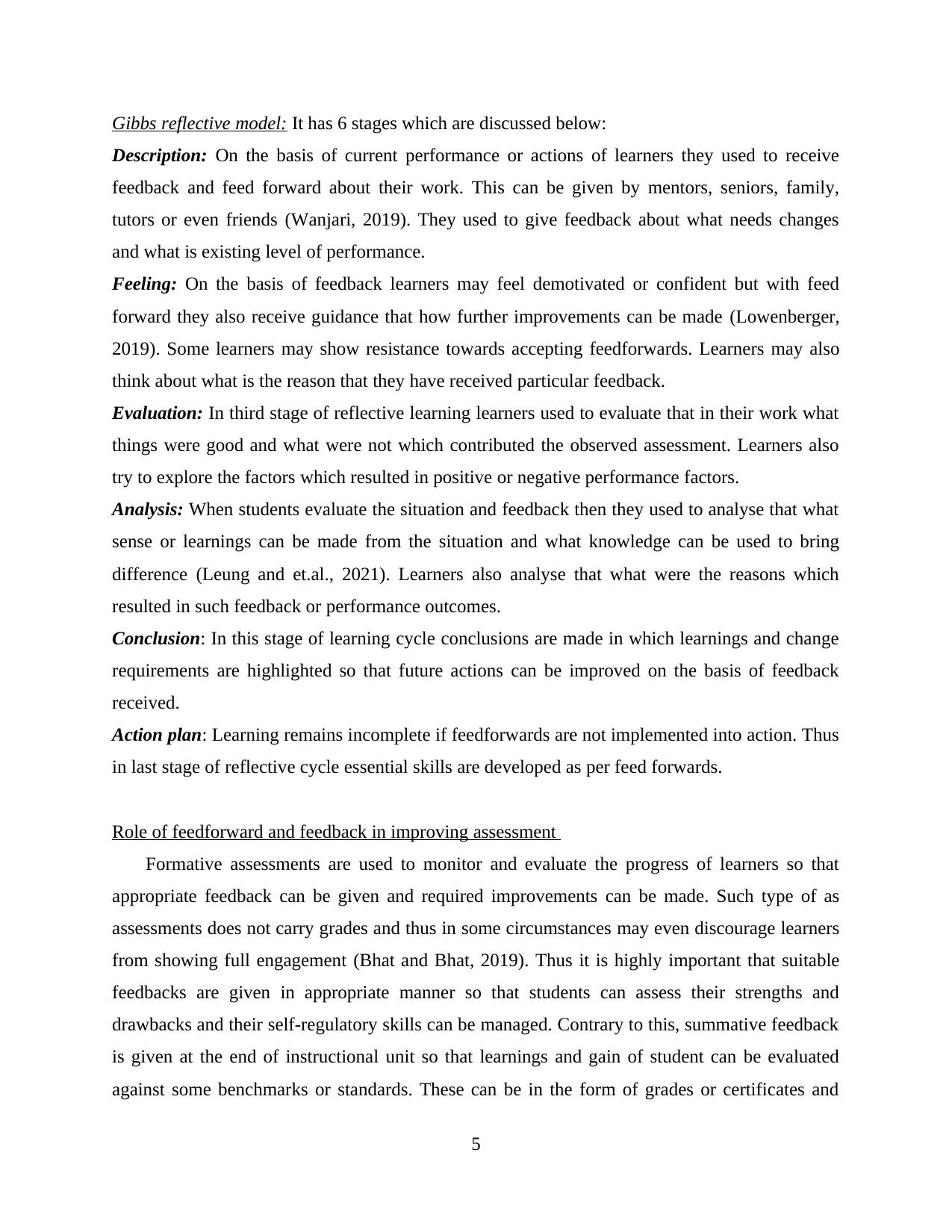
Gibbs reflective model: It has 6 stages which are discussed below:
Description: On the basis of current performance or actions of learners they used to receive
feedback and feed forward about their work. This can be given by mentors, seniors, family,
tutors or even friends (Wanjari, 2019). They used to give feedback about what needs changes
and what is existing level of performance.
Feeling: On the basis of feedback learners may feel demotivated or confident but with feed
forward they also receive guidance that how further improvements can be made (Lowenberger,
2019). Some learners may show resistance towards accepting feedforwards. Learners may also
think about what is the reason that they have received particular feedback.
Evaluation: In third stage of reflective learning learners used to evaluate that in their work what
things were good and what were not which contributed the observed assessment. Learners also
try to explore the factors which resulted in positive or negative performance factors.
Analysis: When students evaluate the situation and feedback then they used to analyse that what
sense or learnings can be made from the situation and what knowledge can be used to bring
difference (Leung and et.al., 2021). Learners also analyse that what were the reasons which
resulted in such feedback or performance outcomes.
Conclusion: In this stage of learning cycle conclusions are made in which learnings and change
requirements are highlighted so that future actions can be improved on the basis of feedback
received.
Action plan: Learning remains incomplete if feedforwards are not implemented into action. Thus
in last stage of reflective cycle essential skills are developed as per feed forwards.
Role of feedforward and feedback in improving assessment
Formative assessments are used to monitor and evaluate the progress of learners so that
appropriate feedback can be given and required improvements can be made. Such type of as
assessments does not carry grades and thus in some circumstances may even discourage learners
from showing full engagement (Bhat and Bhat, 2019). Thus it is highly important that suitable
feedbacks are given in appropriate manner so that students can assess their strengths and
drawbacks and their self-regulatory skills can be managed. Contrary to this, summative feedback
is given at the end of instructional unit so that learnings and gain of student can be evaluated
against some benchmarks or standards. These can be in the form of grades or certificates and
5
Description: On the basis of current performance or actions of learners they used to receive
feedback and feed forward about their work. This can be given by mentors, seniors, family,
tutors or even friends (Wanjari, 2019). They used to give feedback about what needs changes
and what is existing level of performance.
Feeling: On the basis of feedback learners may feel demotivated or confident but with feed
forward they also receive guidance that how further improvements can be made (Lowenberger,
2019). Some learners may show resistance towards accepting feedforwards. Learners may also
think about what is the reason that they have received particular feedback.
Evaluation: In third stage of reflective learning learners used to evaluate that in their work what
things were good and what were not which contributed the observed assessment. Learners also
try to explore the factors which resulted in positive or negative performance factors.
Analysis: When students evaluate the situation and feedback then they used to analyse that what
sense or learnings can be made from the situation and what knowledge can be used to bring
difference (Leung and et.al., 2021). Learners also analyse that what were the reasons which
resulted in such feedback or performance outcomes.
Conclusion: In this stage of learning cycle conclusions are made in which learnings and change
requirements are highlighted so that future actions can be improved on the basis of feedback
received.
Action plan: Learning remains incomplete if feedforwards are not implemented into action. Thus
in last stage of reflective cycle essential skills are developed as per feed forwards.
Role of feedforward and feedback in improving assessment
Formative assessments are used to monitor and evaluate the progress of learners so that
appropriate feedback can be given and required improvements can be made. Such type of as
assessments does not carry grades and thus in some circumstances may even discourage learners
from showing full engagement (Bhat and Bhat, 2019). Thus it is highly important that suitable
feedbacks are given in appropriate manner so that students can assess their strengths and
drawbacks and their self-regulatory skills can be managed. Contrary to this, summative feedback
is given at the end of instructional unit so that learnings and gain of student can be evaluated
against some benchmarks or standards. These can be in the form of grades or certificates and
5
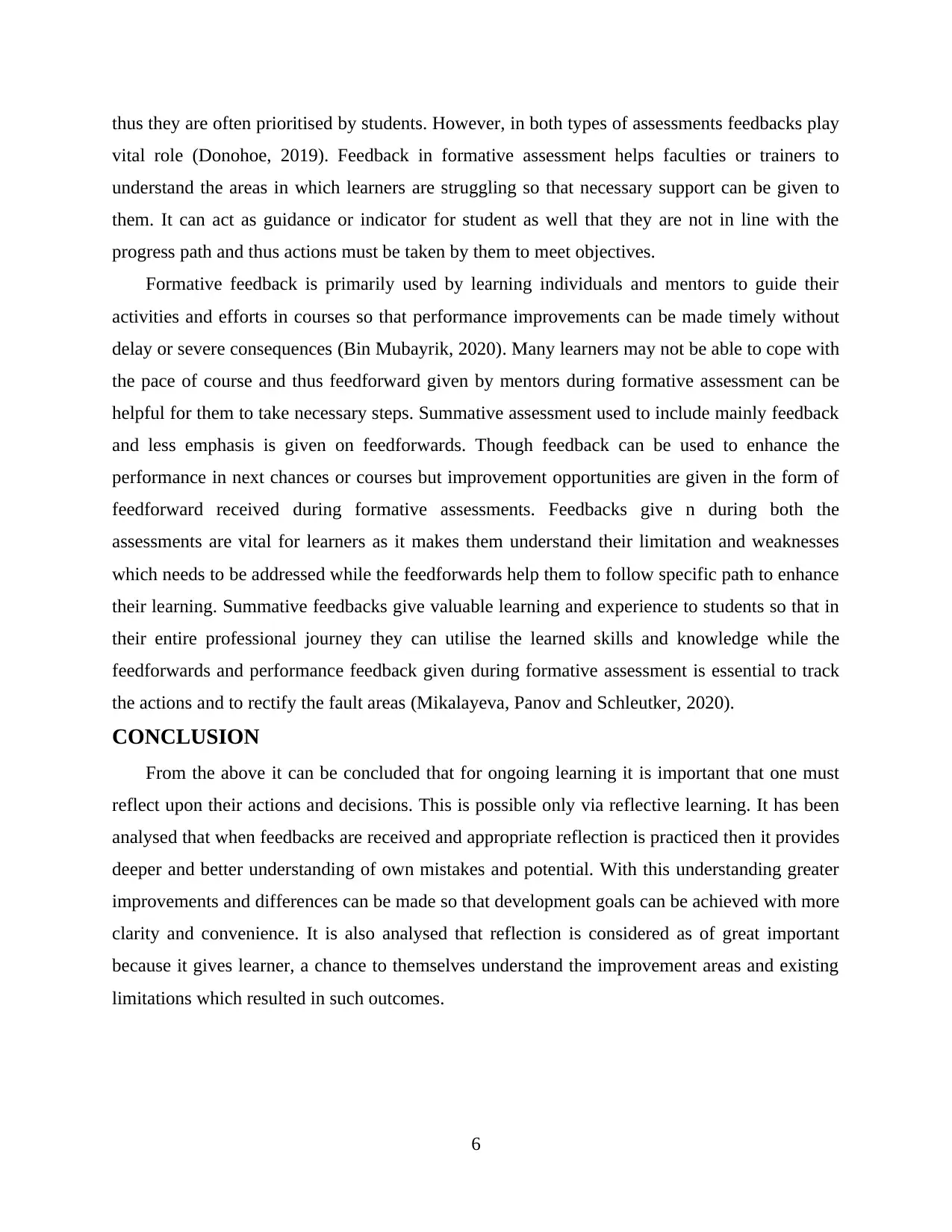
thus they are often prioritised by students. However, in both types of assessments feedbacks play
vital role (Donohoe, 2019). Feedback in formative assessment helps faculties or trainers to
understand the areas in which learners are struggling so that necessary support can be given to
them. It can act as guidance or indicator for student as well that they are not in line with the
progress path and thus actions must be taken by them to meet objectives.
Formative feedback is primarily used by learning individuals and mentors to guide their
activities and efforts in courses so that performance improvements can be made timely without
delay or severe consequences (Bin Mubayrik, 2020). Many learners may not be able to cope with
the pace of course and thus feedforward given by mentors during formative assessment can be
helpful for them to take necessary steps. Summative assessment used to include mainly feedback
and less emphasis is given on feedforwards. Though feedback can be used to enhance the
performance in next chances or courses but improvement opportunities are given in the form of
feedforward received during formative assessments. Feedbacks give n during both the
assessments are vital for learners as it makes them understand their limitation and weaknesses
which needs to be addressed while the feedforwards help them to follow specific path to enhance
their learning. Summative feedbacks give valuable learning and experience to students so that in
their entire professional journey they can utilise the learned skills and knowledge while the
feedforwards and performance feedback given during formative assessment is essential to track
the actions and to rectify the fault areas (Mikalayeva, Panov and Schleutker, 2020).
CONCLUSION
From the above it can be concluded that for ongoing learning it is important that one must
reflect upon their actions and decisions. This is possible only via reflective learning. It has been
analysed that when feedbacks are received and appropriate reflection is practiced then it provides
deeper and better understanding of own mistakes and potential. With this understanding greater
improvements and differences can be made so that development goals can be achieved with more
clarity and convenience. It is also analysed that reflection is considered as of great important
because it gives learner, a chance to themselves understand the improvement areas and existing
limitations which resulted in such outcomes.
6
vital role (Donohoe, 2019). Feedback in formative assessment helps faculties or trainers to
understand the areas in which learners are struggling so that necessary support can be given to
them. It can act as guidance or indicator for student as well that they are not in line with the
progress path and thus actions must be taken by them to meet objectives.
Formative feedback is primarily used by learning individuals and mentors to guide their
activities and efforts in courses so that performance improvements can be made timely without
delay or severe consequences (Bin Mubayrik, 2020). Many learners may not be able to cope with
the pace of course and thus feedforward given by mentors during formative assessment can be
helpful for them to take necessary steps. Summative assessment used to include mainly feedback
and less emphasis is given on feedforwards. Though feedback can be used to enhance the
performance in next chances or courses but improvement opportunities are given in the form of
feedforward received during formative assessments. Feedbacks give n during both the
assessments are vital for learners as it makes them understand their limitation and weaknesses
which needs to be addressed while the feedforwards help them to follow specific path to enhance
their learning. Summative feedbacks give valuable learning and experience to students so that in
their entire professional journey they can utilise the learned skills and knowledge while the
feedforwards and performance feedback given during formative assessment is essential to track
the actions and to rectify the fault areas (Mikalayeva, Panov and Schleutker, 2020).
CONCLUSION
From the above it can be concluded that for ongoing learning it is important that one must
reflect upon their actions and decisions. This is possible only via reflective learning. It has been
analysed that when feedbacks are received and appropriate reflection is practiced then it provides
deeper and better understanding of own mistakes and potential. With this understanding greater
improvements and differences can be made so that development goals can be achieved with more
clarity and convenience. It is also analysed that reflection is considered as of great important
because it gives learner, a chance to themselves understand the improvement areas and existing
limitations which resulted in such outcomes.
6
⊘ This is a preview!⊘
Do you want full access?
Subscribe today to unlock all pages.

Trusted by 1+ million students worldwide
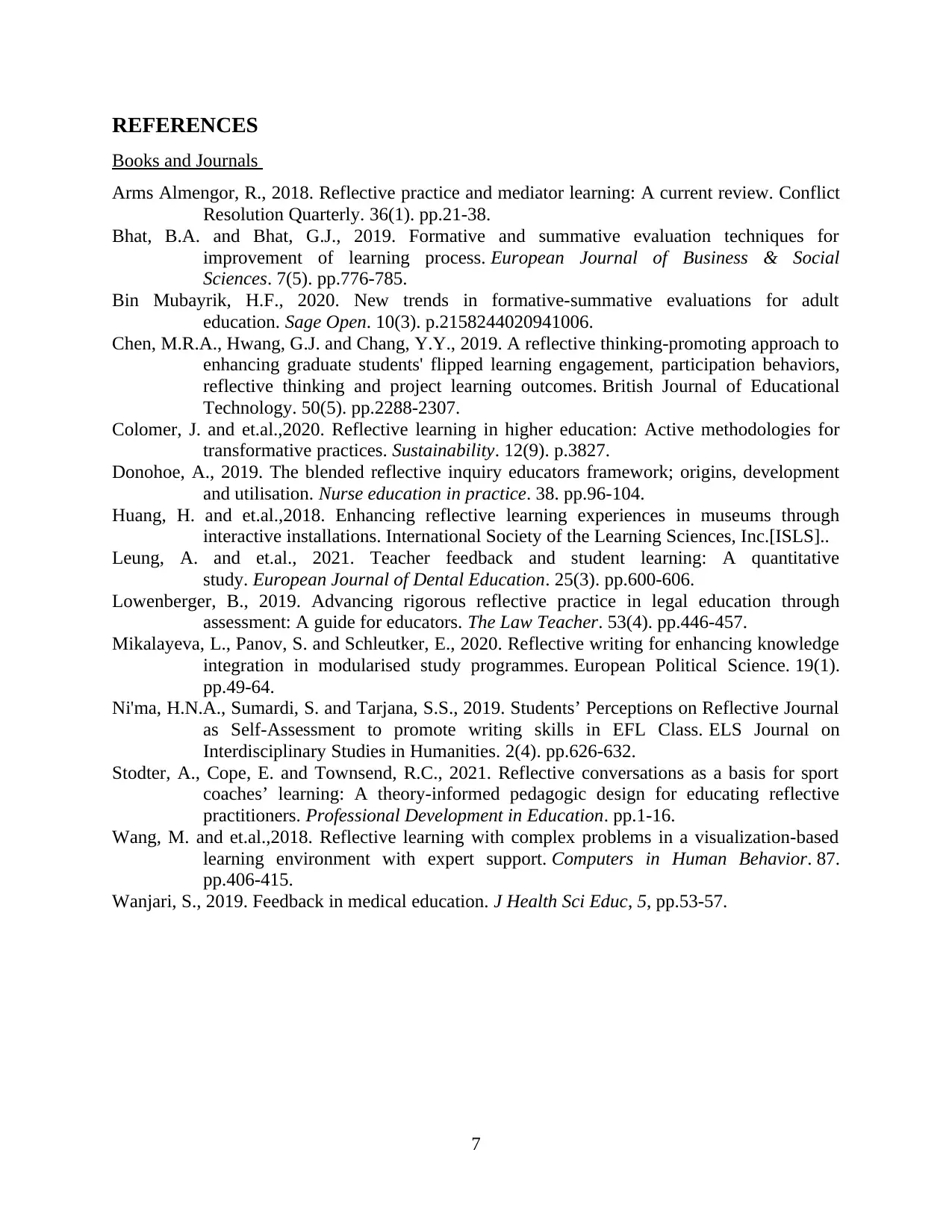
REFERENCES
Books and Journals
Arms Almengor, R., 2018. Reflective practice and mediator learning: A current review. Conflict
Resolution Quarterly. 36(1). pp.21-38.
Bhat, B.A. and Bhat, G.J., 2019. Formative and summative evaluation techniques for
improvement of learning process. European Journal of Business & Social
Sciences. 7(5). pp.776-785.
Bin Mubayrik, H.F., 2020. New trends in formative-summative evaluations for adult
education. Sage Open. 10(3). p.2158244020941006.
Chen, M.R.A., Hwang, G.J. and Chang, Y.Y., 2019. A reflective thinking‐promoting approach to
enhancing graduate students' flipped learning engagement, participation behaviors,
reflective thinking and project learning outcomes. British Journal of Educational
Technology. 50(5). pp.2288-2307.
Colomer, J. and et.al.,2020. Reflective learning in higher education: Active methodologies for
transformative practices. Sustainability. 12(9). p.3827.
Donohoe, A., 2019. The blended reflective inquiry educators framework; origins, development
and utilisation. Nurse education in practice. 38. pp.96-104.
Huang, H. and et.al.,2018. Enhancing reflective learning experiences in museums through
interactive installations. International Society of the Learning Sciences, Inc.[ISLS]..
Leung, A. and et.al., 2021. Teacher feedback and student learning: A quantitative
study. European Journal of Dental Education. 25(3). pp.600-606.
Lowenberger, B., 2019. Advancing rigorous reflective practice in legal education through
assessment: A guide for educators. The Law Teacher. 53(4). pp.446-457.
Mikalayeva, L., Panov, S. and Schleutker, E., 2020. Reflective writing for enhancing knowledge
integration in modularised study programmes. European Political Science. 19(1).
pp.49-64.
Ni'ma, H.N.A., Sumardi, S. and Tarjana, S.S., 2019. Students’ Perceptions on Reflective Journal
as Self-Assessment to promote writing skills in EFL Class. ELS Journal on
Interdisciplinary Studies in Humanities. 2(4). pp.626-632.
Stodter, A., Cope, E. and Townsend, R.C., 2021. Reflective conversations as a basis for sport
coaches’ learning: A theory-informed pedagogic design for educating reflective
practitioners. Professional Development in Education. pp.1-16.
Wang, M. and et.al.,2018. Reflective learning with complex problems in a visualization-based
learning environment with expert support. Computers in Human Behavior. 87.
pp.406-415.
Wanjari, S., 2019. Feedback in medical education. J Health Sci Educ, 5, pp.53-57.
7
Books and Journals
Arms Almengor, R., 2018. Reflective practice and mediator learning: A current review. Conflict
Resolution Quarterly. 36(1). pp.21-38.
Bhat, B.A. and Bhat, G.J., 2019. Formative and summative evaluation techniques for
improvement of learning process. European Journal of Business & Social
Sciences. 7(5). pp.776-785.
Bin Mubayrik, H.F., 2020. New trends in formative-summative evaluations for adult
education. Sage Open. 10(3). p.2158244020941006.
Chen, M.R.A., Hwang, G.J. and Chang, Y.Y., 2019. A reflective thinking‐promoting approach to
enhancing graduate students' flipped learning engagement, participation behaviors,
reflective thinking and project learning outcomes. British Journal of Educational
Technology. 50(5). pp.2288-2307.
Colomer, J. and et.al.,2020. Reflective learning in higher education: Active methodologies for
transformative practices. Sustainability. 12(9). p.3827.
Donohoe, A., 2019. The blended reflective inquiry educators framework; origins, development
and utilisation. Nurse education in practice. 38. pp.96-104.
Huang, H. and et.al.,2018. Enhancing reflective learning experiences in museums through
interactive installations. International Society of the Learning Sciences, Inc.[ISLS]..
Leung, A. and et.al., 2021. Teacher feedback and student learning: A quantitative
study. European Journal of Dental Education. 25(3). pp.600-606.
Lowenberger, B., 2019. Advancing rigorous reflective practice in legal education through
assessment: A guide for educators. The Law Teacher. 53(4). pp.446-457.
Mikalayeva, L., Panov, S. and Schleutker, E., 2020. Reflective writing for enhancing knowledge
integration in modularised study programmes. European Political Science. 19(1).
pp.49-64.
Ni'ma, H.N.A., Sumardi, S. and Tarjana, S.S., 2019. Students’ Perceptions on Reflective Journal
as Self-Assessment to promote writing skills in EFL Class. ELS Journal on
Interdisciplinary Studies in Humanities. 2(4). pp.626-632.
Stodter, A., Cope, E. and Townsend, R.C., 2021. Reflective conversations as a basis for sport
coaches’ learning: A theory-informed pedagogic design for educating reflective
practitioners. Professional Development in Education. pp.1-16.
Wang, M. and et.al.,2018. Reflective learning with complex problems in a visualization-based
learning environment with expert support. Computers in Human Behavior. 87.
pp.406-415.
Wanjari, S., 2019. Feedback in medical education. J Health Sci Educ, 5, pp.53-57.
7
1 out of 7
Related Documents
Your All-in-One AI-Powered Toolkit for Academic Success.
+13062052269
info@desklib.com
Available 24*7 on WhatsApp / Email
![[object Object]](/_next/static/media/star-bottom.7253800d.svg)
Unlock your academic potential
Copyright © 2020–2025 A2Z Services. All Rights Reserved. Developed and managed by ZUCOL.
